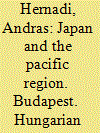| Srl | Item |
| 1 |
ID:
088858


|
|
|
| 2 |
ID:
043232


|
|
|
|
|
| Publication |
Budapest, Hungarian Scientific Council for World Economy, 1982.
|
| Description |
87p.
|
| Series |
Trends in world economy
|
| Standard Number |
9633010977
|
|
|
|
|
|
|
|
|
|
|
|
Copies: C:1/I:0,R:0,Q:0
Circulation
| Accession# | Call# | Current Location | Status | Policy | Location |
| 021489 | 337.1/HER 021489 | Main | On Shelf | General | |
|
|
|
|
| 3 |
ID:
101778


|
|
|
| 4 |
ID:
088760


|
|
|
|
|
| Publication |
2009.
|
| Summary/Abstract |
Until 1997, the only preferential trading arrangement, which existed in East Asia, was the ASEAN Free Trade Area (AFTA). Former Prime Minister of Malaysia Tun Dr. Mahathir had realized earlier the deficiency of AFTA in terms of stimulating economic development. In 1990, he proposed to ASEAN members to form the East Asian Economic Group. Due to regional political factors, his proposal was turned down and replaced with the East Asian Economic Caucus in 1992. In 1997, again, he proposed that ASEAN needed to establish large economic cooperation with other countries in East Asia. His suggestion had been warmly responded by the members of East Asian countries. At the ASEAN summit in Manila 1999, ASEAN Plus 3 (APT) was created. ASEAN, China, Japan, and South Korea had agreed and reached a joint statement to form a free-trade area by the year 2020. The establishment of APT was timely since most countries in the world are moving toward establishing wider or larger economic blocs due to the failure of multilateralism of the WTO in creating a new trade agreement.
|
|
|
|
|
|
|
|
|
|
|
|
|
|
|
|